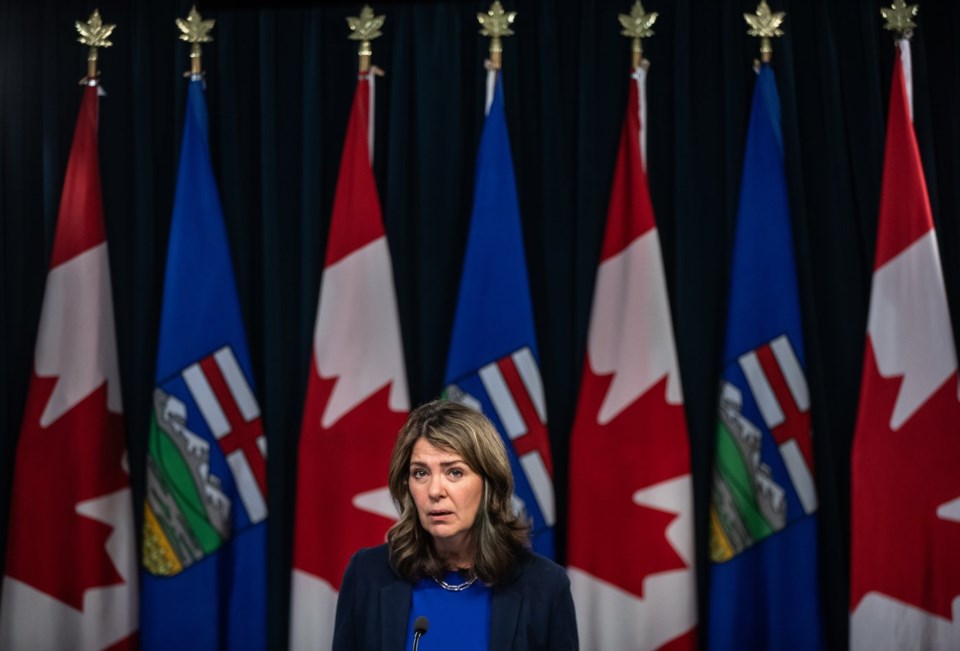CALGARY ā As separatist discontent bubbles up anew in Alberta, experts say a vote to sever ties with Canada would pitch the country into unexplored territory on everything from money to First Nations and national parks.
āYouāre in terra incognita. Youāre off the map when we get to that stage of the proceedings,ā said law professor Eric Adams.
āA lot of things are going to be broken on the way out the door.ā
The discontent elbowed its way back into the headlines last week, with Prime Minister Mark Carneyās Liberals winning another mandate followed by Premier Danielle Smithās government introducing a bill that would sharply lower the bar for citizens seeking to trigger provincewide referendums.
The bill would change citizen-initiated referendum rules to require a petition signed by 10 per cent of the eligible voters in a previous general election ā down from 20 per cent of total registered voters. Applicants would also get 120 days, rather than 90, to collect the required 177,000 signatures.
Smith says Alberta has no choice but to take steps to combat a decade of hostile federal Liberal policies, which she says have not only taken an unfair share of Albertaās wealth -- but in doing so have also undermined the oil and gas industry that drives its economy.
The Alberta premier has repeatedly said she doesnāt want to separate, but says she needs to respect the voices of Albertans and, should there be enough signatures, has promised to initiate a separation referendum as early as next year.
Adams, a law professor at the University of Alberta with an expertise in constitutional issues, said the Supreme Court of Canada has set loose guidelines on what would happen should a province vote to separate.
Provinces cannot unilaterally separate from the country, and a vote in favour of separation would trigger negotiations with the province, federal government and other groups including First Nations.
And therein lie future questions and disputes.
Ownership over swaths of Crown land, including Albertaās Banff and Jasper national parks, would be a point of contention, said Allan Hutchinson, professor at Osgoode Hall Law School in Toronto. He said similar questions were debated before the 1995 referendum in Quebec but never reached a conclusion.
"Maybe the feds will say, 'We own massive parts, they're national parks. They're not yours to give away,'" Hutchinson said. "Maybe they'll say, 'Yeah, you can leave, but Alberta is going to turn out to be about a tenth of the size of what you think Alberta is.'"
Smith has promised a two-track strategy for the rest of this year: negotiating with Carneyās government to make changes to laws and policies to buoy Albertaās economy -- specifically its oil and gas industry -- while also hosting town hall meetings across the province to gauge specific concerns on Albertaās current status in Confederation.
Alberta First Nations have pushed back on the provincial government's latest changes to the referendum bill. Indigenous leaders on Tuesday said the premier was using legislation to get people "to do her dirty work."
Bruce McIvor, a treaty law expert, said Alberta would face pushback from First Nations arguing that they would never give up their land, and that separation would violate their treaties with the federal government.
āIndigenous peopleās perspective ā what I hear usually ā is that they entered into treaty agreements premised on sharing the land, not surrendering it,ā McIvor said.
āYou canāt steal someoneās property and say, āIām leaving.āā
Smith has said a yes vote to any referendum must not violate First Nationsā constitutional treaty rights.
Hutchinson said heās skeptical First Nations would get a fair shake in negotiations.
āThey should listen to Indigenous people, but I doubt that the Indigenous people will get a veto. I really can't see that occurring."
Adams said itās doubtful any referendum question posed to Albertans could clarify exactly what the province would be getting into. Questions would remain surrounding the status of Alberta's currency, trade agreements, federal supports and transfer payments, and mobility across borders.
The international dynamics would also become unpredictable, with adversaries potentially looking to capitalize on a period of major instability, Adams said.
U.S. President Donald Trump has continually and openly opined about the mutual benefits that would arise from annexing Canada despite Carney stating to Trumpās face this week that Canada is ānot for sale.ā
"I don't think anybody should be naive that any of this would be easy, that any of this would be knowable in advance, that anyone can promise what would transpire,ā Adams said.
"Once a chain reaction of this magnitude is unleashed, no one knows where it leads."
This report by The Canadian Press was first published May 8, 2025.
Matthew Scace, The Canadian Press




